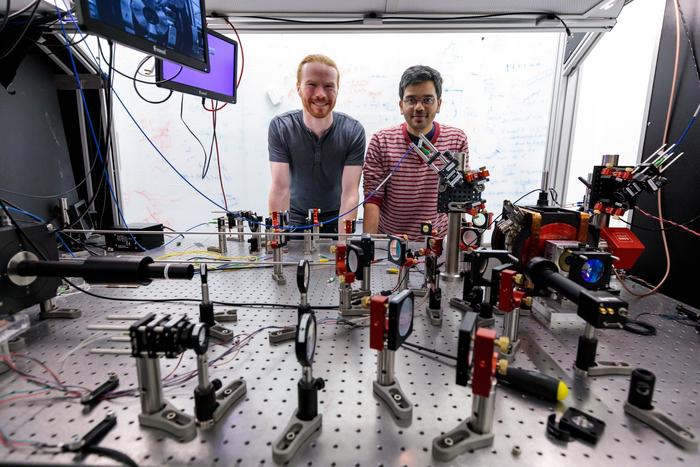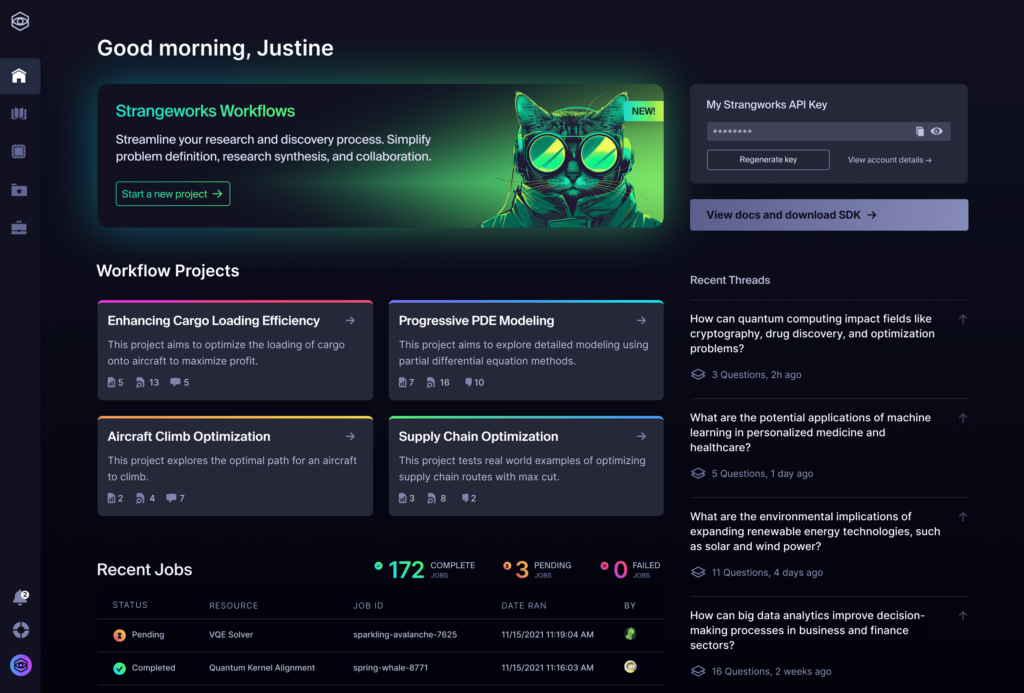Insider Brief
- Congresswoman Elise Stefanik and Senator Marsha Blackburn introduced the Defense Quantum Acceleration Act.
- The lawmakers said the legislation would boost the Department of Defense’s (DoD) approach to quantum technology and advance U.S. national security.
- Among other initiatives, the bill would establish a framework for the DoD to optimize its approach to the development and transitioning of quantum tech and authorize a defense quantum technology testbed.
PRESS RELEASE — Congresswoman Elise Stefanik and Senator Marsha Blackburn introduced the Defense Quantum Acceleration Act, legislation that would supercharge the Department of Defense’s (DoD) approach to quantum technology and advance U.S. national security, building on the excellent work done by Air Force Research Lab (AFRL) – Rome, in Rome, New York.
Currently, there are a number of tremendous individual efforts in quantum across the DoD, such as the quantum computing work being done by AFRL-Rome, but these efforts lack a unified effort and focus on transitioning quantum-enhanced capabilities to the warfighter on a relevant timeline.

This bill would establish a framework for the DoD to optimize its approach to the development and transitioning of quantum technology by empowering a Principal Quantum Advisor to the Secretary of Defense to develop a strategic quantum roadmap and provide an independent budget assessment of current DoD quantum budgets to Congress. The bill would also authorize a defense quantum technology testbed to enable the Defense Innovation Unit to successfully execute the transition of near-term quantum capabilities using the $55 million of funding it received for this purpose in Fiscal Year 2024.
“I am proud to lead this critical legislation to ensure the United States maintains a quantum technological advantage over our adversaries, including Communist China,” said Representative Stefanik. “Quantum’s impact on our national security will be considerable and we must take immediate steps to ensure the United States is the first nation to reach quantum advantage. This bill will ensure the Department of Defense, led by the incredible work at Rome Labs, is able to outpace our adversaries and rapidly develop and transition quantum technologies to our service members.”

“U.S. advancement of quantum technology is critical for our nation to compete on the global stage, as Communist China has made clear their goal to lead the world in this industry by 2049,” said Senator Blackburn. “This legislation helps ensure the Department of Defense maximizes its developmental resources and capitalizes on the incredible work happening at the local level, including in Chattanooga and Oak Ridge.”
“Congresswoman Stefanik’s legislation is critical to our national and economic security, and I applaud her foresight in making applied quantum information sciences a priority for the Department of Defense. Much of the military’s pathbreaking work in QIS is led by Rome Labs, whose open innovation? initiatives are performed in our world-leading laboratories at Innovare Advancement Center in Rome, NY, where we embed the national quantum workforce strategy into all of our research programs to develop the next generation of quantum scientists, engineers, and entrepreneurs. Today, QIS technology is in the laboratory but tomorrow it will likely be in the battlespace. To prepare for this, the U.S. military must have a robust applied QIS R&D infrastructure and talent pipeline to ensure that we are transitioning advances rapidly from the laboratory to the warfighter. That’s precisely what this bill is all about, and I thank Congresswoman Stefanik for introducing it,” said Heather Hage, President and CEO of the Griffiss Institute.
“The Defense Quantum Acceleration Act signifies a critical commitment to leveraging quantum technology to its fullest potential, ensuring that the United States remains at the forefront of technological advancement and strategic defense capabilities. Congresswoman Stefanik is providing key leadership in bolstering America’s national defense industry and securing our nation as the global leader in quantum technology,”said Marc P. Christensen, P.E., Ph.D., President of Clarkson University. “Clarkson University is among our nation’s technological institutions advancing quantum capabilities with the Department of Defense through partnerships like the one we have with Rome Labs, as well as defense contractors on all facets of applied research and educating graduates ready to lead industry in advancing these technologies.”
“IBM applauds Representative Stefanik and Senator Blackburn for introducing their Defense Quantum Acceleration Act, which helps ensure the Department of Defense embraces this revolutionary technology. For national defense and economic security reasons, the United States must maintain a leadership position in quantum computing, and this legislation supports that effort. IBM encourages Congress to pass it and the Administration to begin deploying quantum-centric supercomputing,” said Chris Padilla, Vice President of Government and Regulatory Affairs at IBM.
“Quantum technologies, including computing, sensors, and networking, have the potential to revolutionize national security. The nation that leads in these areas will have a significant military advantage. The Quantum Industry Coalition applauds Rep. Stefanik and Sen. Blackburn for recognizing this, and for introducing the Defense Quantum Acceleration Act to help ensure that the United States will be the world quantum leader for years to come,” said Paul Stimers, Executive Director of the Quantum Industry Coalition.
“The Defense Quantum Acceleration Act is landmark legislation. For the first time it makes sure the most important advances in quantum information science, from quantum computing and quantum sensing to the latest developments in quantum communication and hybrid technologies, become part of our national defense arsenal. At a time when our race for quantum supremacy against China is crucial to the security of America, the DQAA will empower the Department of Defense to find the applications of quantum technology that best serve its needs and requirements, today and far into the future,” said Arthur Herman Senior Fellow, Hudson Institute & Director, Quantum Alliance Initiative.
“The field of quantum information science and its applications is a critical area of strategic competition for the United States, and one which the nation cannot afford to lose. Securing a quantum advantage for the warfighter will require a deliberate approach to cultivating these technologies,” said Heather Penney, Senior Fellow at the Air and Space Forces Association’s Mitchell Institute for Aerospace Studies.
“PsiQuantum’s mission is to build the world’s first useful quantum computer, and we are grateful for Rep. Stefanik and Sen. Blackburn’s continued leadership on quantum technologies,” said Jeremy O’Brien, CEO and Co-Founder of PsiQuantum. “Utility-scale, fault tolerant quantum computing will be a reality much sooner than conventionally predicted, and both Rep. Stefanik and Sen. Blackburn have understood this reality for years. The Defense Quantum Acceleration Act will ensure that the Department of Defense is prepared to capitalize on the unique ways in which fault tolerant quantum computing can help advance national security imperatives, in both the near- and long-term.”
“Quantum information science – and quantum computing in particular – is absolutely crucial to our national and economic security. This bill showcases the U.S.’s strategic vision and leadership that is needed to drive quantum adoption for our nation’s defense and intelligence community,” said Peter Chapman, CEO and President of IonQ. “We believe the Defense Quantum Acceleration Act of 2024 and continued investments by the US Department of Defense in quantum will further accelerate the deployment of transformative computing solutions. We continue to take pride in IonQ’s role as a partner to the U.S. Department of Defense and are excited to support Congresswoman Stefanik and Senator Marsha Blackburn’s strategic vision.”
“We applaud Rep. Stefanik for introducing the Defense Quantum Acceleration Act, a policy that will provide a framework for the Department of Defense and its service branches to identify problems that could be addressed by quantum technologies,” said Dr. Alan Baratz, CEO of D-Wave. “Developing and accelerating adoption of quantum and quantum-hybrid applications is critical to achieving mission objectives such as challenges facing the modern battlefield and supply chain logistics. Quantum technologies are advancing at different rates and utilizing the most advanced systems will help achieve an edge in national security.”
“Atom Computing commends Congresswoman Stefanik and Senator Blackburn for spearheading the “Defense Quantum Acceleration Act”, empowering the Department of Defense to more effectively organize disparate initiatives and operationalize critical quantum technologies that could enable asymmetric competitive advantage for the warfighter. This legislation will give the Department a strategic role in accelerating utility-scale fault-tolerant quantum computing for our national security,” said Rob Hays, CEO of Atom Computing.
“As the world’s largest integrated quantum computing company, Quantinuum strongly supports the Defense Quantum Acceleration Act introduced by Representative Stefanik and Senator Blackburn. Quantum computing is rapidly advancing from the lab to the commercial marketplace and US leadership for this emerging technology will be crucial for economic and national security alike. We believe that the Defense Quantum Acceleration Act will supercharge the Department of Defense’s approach to quantum and drive crucial near-term use cases and workforce development across government and industry,” said Ryan McKenney, Director of Government Relations at Quantinuum.
If you found this article to be informative, you can explore more current quantum news here, exclusives, interviews, and podcasts.




















